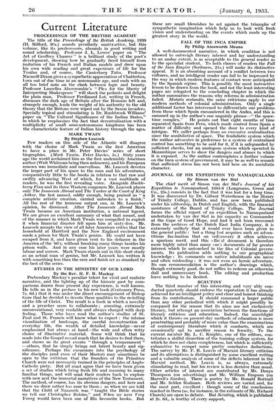Prebendary Mackay's peculiar talent for vivid and realistic narrative ' and
the lighting up of the historic past by com- parisons drawn from present day experience, is -well known. He tells us in the preface to his new book (Centenary Press, 75. 6d.) that it was under the direct encouragement of Bishop Gore that he decided to devote these qualities to the re-telling of the life of Christ. The result is a book in which a novelist and a preacher seem to collaborate ; arresting, extremely unconventional, very readable and always charged with deep feeling. Those who have read the author's studies of St. _Paul and St. Francis will know what to expect : the intense visualization of landscape, the careful reconstruction of everyday life, the wealth of detailed knowledge—never emphasized but always at hand—the wide and often witty choice of illustrative material. Some will think that he reads into the Gospel record much that he desires to find there, and shows us its great events "through a temperament" —others, that he simply brings out latent beauty and sig- nificance. Perhaps the excursions into the psychology of the disciples (and even of their Master) may sometimes be open to the criticism that the founders of the Primitive Church were not necessarily trained in the principles of Anglo- Catholic piety. But all must agree that we have been given a set of studies which bring fresh life and meaning to many familiar things, and will send their readers back to explore with new zest the immortal narratives of the New Testament.
method, of course, has its obvious dangers, and here and there we draw rather too near to them ; as when we are told that the Child of Nazareth was "taught the Bible stories we tell our Christopher Robins," and When we were Very Young would have been one of His favourite books. But these are small blemishes to set against the triumphs of Sympathetic imagination which help us to look with fresh yision and understanding on the events which made up the greatest story in the world.




































 Previous page
Previous page